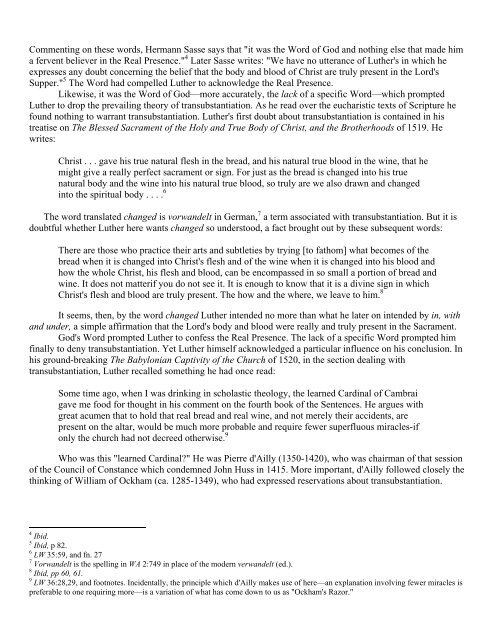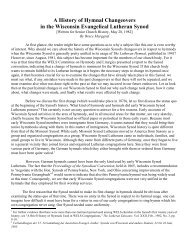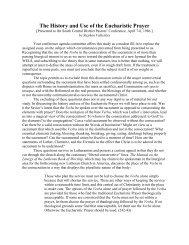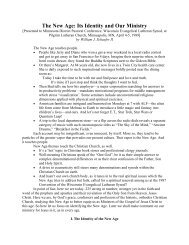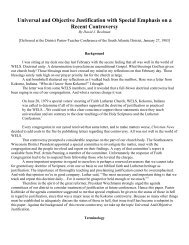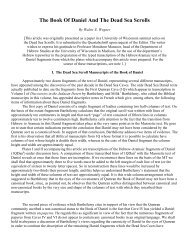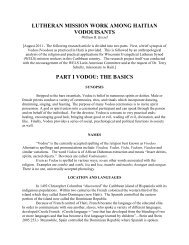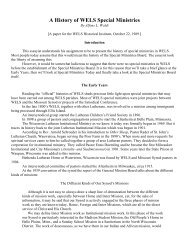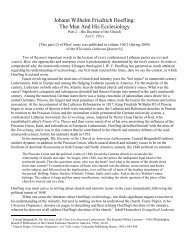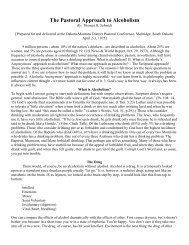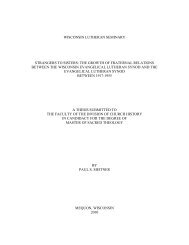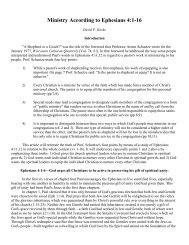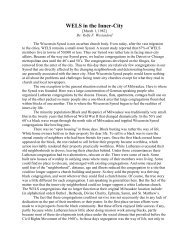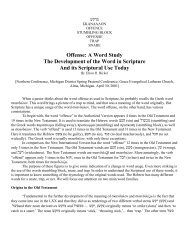the influence of william of ockham on luther's eucharistic theology
the influence of william of ockham on luther's eucharistic theology
the influence of william of ockham on luther's eucharistic theology
Create successful ePaper yourself
Turn your PDF publications into a flip-book with our unique Google optimized e-Paper software.
Commenting <strong>on</strong> <str<strong>on</strong>g>the</str<strong>on</strong>g>se words, Hermann Sasse says that "it was <str<strong>on</strong>g>the</str<strong>on</strong>g> Word <str<strong>on</strong>g>of</str<strong>on</strong>g> God and nothing else that made him<br />
a fervent believer in <str<strong>on</strong>g>the</str<strong>on</strong>g> Real Presence." 4 Later Sasse writes: "We have no utterance <str<strong>on</strong>g>of</str<strong>on</strong>g> Lu<str<strong>on</strong>g>the</str<strong>on</strong>g>r's in which he<br />
expresses any doubt c<strong>on</strong>cerning <str<strong>on</strong>g>the</str<strong>on</strong>g> belief that <str<strong>on</strong>g>the</str<strong>on</strong>g> body and blood <str<strong>on</strong>g>of</str<strong>on</strong>g> Christ are truly present in <str<strong>on</strong>g>the</str<strong>on</strong>g> Lord's<br />
Supper." 5 The Word had compelled Lu<str<strong>on</strong>g>the</str<strong>on</strong>g>r to acknowledge <str<strong>on</strong>g>the</str<strong>on</strong>g> Real Presence.<br />
Likewise, it was <str<strong>on</strong>g>the</str<strong>on</strong>g> Word <str<strong>on</strong>g>of</str<strong>on</strong>g> God—more accurately, <str<strong>on</strong>g>the</str<strong>on</strong>g> lack <str<strong>on</strong>g>of</str<strong>on</strong>g> a specific Word—which prompted<br />
Lu<str<strong>on</strong>g>the</str<strong>on</strong>g>r to drop <str<strong>on</strong>g>the</str<strong>on</strong>g> prevailing <str<strong>on</strong>g>the</str<strong>on</strong>g>ory <str<strong>on</strong>g>of</str<strong>on</strong>g> transubstantiati<strong>on</strong>. As he read over <str<strong>on</strong>g>the</str<strong>on</strong>g> <strong>eucharistic</strong> texts <str<strong>on</strong>g>of</str<strong>on</strong>g> Scripture he<br />
found nothing to warrant transubstantiati<strong>on</strong>. Lu<str<strong>on</strong>g>the</str<strong>on</strong>g>r's first doubt about transubstantiati<strong>on</strong> is c<strong>on</strong>tained in his<br />
treatise <strong>on</strong> The Blessed Sacrament <str<strong>on</strong>g>of</str<strong>on</strong>g> <str<strong>on</strong>g>the</str<strong>on</strong>g> Holy and True Body <str<strong>on</strong>g>of</str<strong>on</strong>g> Christ, and <str<strong>on</strong>g>the</str<strong>on</strong>g> Bro<str<strong>on</strong>g>the</str<strong>on</strong>g>rhoods <str<strong>on</strong>g>of</str<strong>on</strong>g> 1519. He<br />
writes:<br />
Christ . . . gave his true natural flesh in <str<strong>on</strong>g>the</str<strong>on</strong>g> bread, and his natural true blood in <str<strong>on</strong>g>the</str<strong>on</strong>g> wine, that he<br />
might give a really perfect sacrament or sign. For just as <str<strong>on</strong>g>the</str<strong>on</strong>g> bread is changed into his true<br />
natural body and <str<strong>on</strong>g>the</str<strong>on</strong>g> wine into his natural true blood, so truly are we also drawn and changed<br />
into <str<strong>on</strong>g>the</str<strong>on</strong>g> spiritual body . . . . 6<br />
The word translated changed is vorwandelt in German, 7 a term associated with transubstantiati<strong>on</strong>. But it is<br />
doubtful whe<str<strong>on</strong>g>the</str<strong>on</strong>g>r Lu<str<strong>on</strong>g>the</str<strong>on</strong>g>r here wants changed so understood, a fact brought out by <str<strong>on</strong>g>the</str<strong>on</strong>g>se subsequent words:<br />
There are those who practice <str<strong>on</strong>g>the</str<strong>on</strong>g>ir arts and subtleties by trying [to fathom] what becomes <str<strong>on</strong>g>of</str<strong>on</strong>g> <str<strong>on</strong>g>the</str<strong>on</strong>g><br />
bread when it is changed into Christ's flesh and <str<strong>on</strong>g>of</str<strong>on</strong>g> <str<strong>on</strong>g>the</str<strong>on</strong>g> wine when it is changed into his blood and<br />
how <str<strong>on</strong>g>the</str<strong>on</strong>g> whole Christ, his flesh and blood, can be encompassed in so small a porti<strong>on</strong> <str<strong>on</strong>g>of</str<strong>on</strong>g> bread and<br />
wine. It does not matterif you do not see it. It is enough to know that it is a divine sign in which<br />
Christ's flesh and blood are truly present. The how and <str<strong>on</strong>g>the</str<strong>on</strong>g> where, we leave to him. 8<br />
It seems, <str<strong>on</strong>g>the</str<strong>on</strong>g>n, by <str<strong>on</strong>g>the</str<strong>on</strong>g> word changed Lu<str<strong>on</strong>g>the</str<strong>on</strong>g>r intended no more than what he later <strong>on</strong> intended by in, with<br />
and under, a simple affirmati<strong>on</strong> that <str<strong>on</strong>g>the</str<strong>on</strong>g> Lord's body and blood were really and truly present in <str<strong>on</strong>g>the</str<strong>on</strong>g> Sacrament.<br />
God's Word prompted Lu<str<strong>on</strong>g>the</str<strong>on</strong>g>r to c<strong>on</strong>fess <str<strong>on</strong>g>the</str<strong>on</strong>g> Real Presence. The lack <str<strong>on</strong>g>of</str<strong>on</strong>g> a specific Word prompted him<br />
finally to deny transubstantiati<strong>on</strong>. Yet Lu<str<strong>on</strong>g>the</str<strong>on</strong>g>r himself acknowledged a particular <str<strong>on</strong>g>influence</str<strong>on</strong>g> <strong>on</strong> his c<strong>on</strong>clusi<strong>on</strong>. In<br />
his ground-breaking The Babyl<strong>on</strong>ian Captivity <str<strong>on</strong>g>of</str<strong>on</strong>g> <str<strong>on</strong>g>the</str<strong>on</strong>g> Church <str<strong>on</strong>g>of</str<strong>on</strong>g> 1520, in <str<strong>on</strong>g>the</str<strong>on</strong>g> secti<strong>on</strong> dealing with<br />
transubstantiati<strong>on</strong>, Lu<str<strong>on</strong>g>the</str<strong>on</strong>g>r recalled something he had <strong>on</strong>ce read:<br />
Some time ago, when I was drinking in scholastic <str<strong>on</strong>g>the</str<strong>on</strong>g>ology, <str<strong>on</strong>g>the</str<strong>on</strong>g> learned Cardinal <str<strong>on</strong>g>of</str<strong>on</strong>g> Cambrai<br />
gave me food for thought in his comment <strong>on</strong> <str<strong>on</strong>g>the</str<strong>on</strong>g> fourth book <str<strong>on</strong>g>of</str<strong>on</strong>g> <str<strong>on</strong>g>the</str<strong>on</strong>g> Sentences. He argues with<br />
great acumen that to hold that real bread and real wine, and not merely <str<strong>on</strong>g>the</str<strong>on</strong>g>ir accidents, are<br />
present <strong>on</strong> <str<strong>on</strong>g>the</str<strong>on</strong>g> altar, would be much more probable and require fewer superfluous miracles-if<br />
<strong>on</strong>ly <str<strong>on</strong>g>the</str<strong>on</strong>g> church had not decreed o<str<strong>on</strong>g>the</str<strong>on</strong>g>rwise. 9<br />
Who was this "learned Cardinal?" He was Pierre d'Ailly (1350-1420), who was chairman <str<strong>on</strong>g>of</str<strong>on</strong>g> that sessi<strong>on</strong><br />
<str<strong>on</strong>g>of</str<strong>on</strong>g> <str<strong>on</strong>g>the</str<strong>on</strong>g> Council <str<strong>on</strong>g>of</str<strong>on</strong>g> C<strong>on</strong>stance which c<strong>on</strong>demned John Huss in 1415. More important, d'Ailly followed closely <str<strong>on</strong>g>the</str<strong>on</strong>g><br />
thinking <str<strong>on</strong>g>of</str<strong>on</strong>g> William <str<strong>on</strong>g>of</str<strong>on</strong>g> Ockham (ca. 1285-1349), who had expressed reservati<strong>on</strong>s about transubstantiati<strong>on</strong>.<br />
4 Ibid.<br />
5 Ibid, p 82.<br />
6 LW 35:59, and fn. 27<br />
7 Vorwandelt is <str<strong>on</strong>g>the</str<strong>on</strong>g> spelling in WA 2:749 in place <str<strong>on</strong>g>of</str<strong>on</strong>g> <str<strong>on</strong>g>the</str<strong>on</strong>g> modern verwandelt (ed.).<br />
8 Ibid, pp 60, 61.<br />
9 LW 36:28,29, and footnotes. Incidentally, <str<strong>on</strong>g>the</str<strong>on</strong>g> principle which d'Ailly makes use <str<strong>on</strong>g>of</str<strong>on</strong>g> here—an explanati<strong>on</strong> involving fewer miracles is<br />
preferable to <strong>on</strong>e requiring more—is a variati<strong>on</strong> <str<strong>on</strong>g>of</str<strong>on</strong>g> what has come down to us as "Ockham's Razor."


